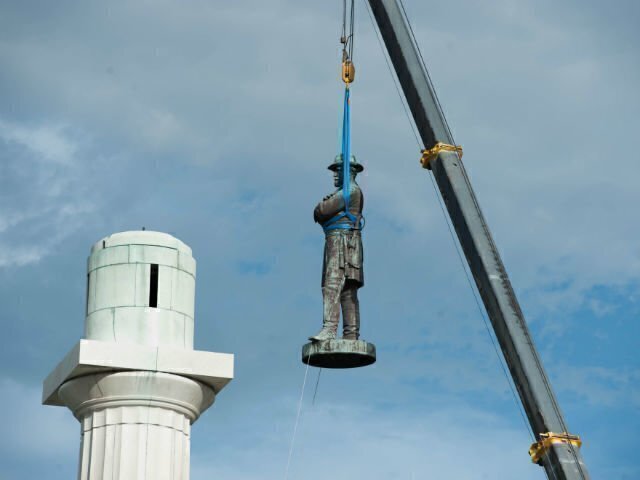Do local governments have the ability to remove monuments in public spaces that commemorate the Confederacy, its military or its leaders? The heated debate is now heading through the legal system after a very public controversy last year.
 At least four lawsuits about the monuments involve alleged conflicts with state and local laws about the protection of war memorials and property rights. But another one is in federal court, and several scholars believe the monuments’ existence touches on broader constitutional issues.
At least four lawsuits about the monuments involve alleged conflicts with state and local laws about the protection of war memorials and property rights. But another one is in federal court, and several scholars believe the monuments’ existence touches on broader constitutional issues.
Last August, violence at protests in Charlottesville, Virginia about a Robert E. Lee statute left one person dead. Two police officers also died in a helicopter crash related to the protests. The Charlottesville Lee statue is still unsettled in Virginia state court.
Judge Richard Moore issued an injunction in the lawsuit over the statue in October 2017 that kept the monument in place, but under a shroud, until arguments are heard in court next month. The lawsuit filed last March by the Virginia Division of the Sons of Confederate Veterans, Inc. and the Monument Fund, Inc. claims that the Lee statue is a war memorial for veterans and protected by a state law.
That law, which goes back to 1950, makes it illegal to remove a war memorial related to “the War Between the States.” The suit also claims the deed that granted the land to the city for the park where the statue resides bars its removal. Judge Moore did issue a preliminary ruling last October that he believed the statue could be a war memorial, but he wanted both sides to present more evidence.
In Birmingham, Alabama, another lawsuit involves a 52-foot-high pillar in a park that was dedicated in 1905 to Confederate veterans and funded by the United Daughters of the Confederacy. Last August, Birmingham’s mayor ordered inscriptions on the monument covered after the violence in Charlottesville. Alabama’s attorney general is contesting that move, saying it violates a recently passed state monument protection law. Arguments are scheduled in state court this April about the controversy.
In Memphis, the fight is about the removal statues from a park that portray Confederate general Nathan Bedford Forrest, President Jefferson Davis and a Confederate war correspondent. The Sons of Confederate Veterans and Forrest’s descendants claim Memphis city council wrongfully sold the park where the statues sat to a private party, and that the Forrest statue was part of his grave, and illegally removed.
There is also a case in federal court in the Western District of Louisiana about the Caddo Parish Confederate Monument in Shreveport. Last week, Judge Robert James ruled against the United Daughters of the Confederacy, which claims Parish commissioners illegally removed the monument because the courthouse land under it had been given by the city to the group in 1903 and the action violated the group’s First Amendment free speech rights. Judge James didn’t believe the claim would prevail in court.
In the past years, some scholars have argued that the existence of Confederate monuments presents unique, broader constitutional questions. Last August, Micah Schwartzman and Nelson Tebbe argued on the Slate website that officials in Charlottesville had rights under the Constitution to ignore the Virginia state law protecting Confederate war memorials. “While private citizens may engage in hate speech under existing law, the government may not demean racial or religious minorities without running afoul of the guarantee of equal protection contained in the 14th Amendment,” they claimed. “City council members have a sworn obligation to uphold the Constitution, and if they believe that the monuments violate equal protection as guaranteed by the Constitution, they have an obligation to take them down”
So far, the Supreme Court has stayed out of the debate. Last November, it denied an appeal from a Mississippi attorney, Carlos Moore, who wanted the state flag altered to remove a section containing a Confederate battle flag. Moore believed the emblem violated the 14th Amendment’s Equal Protection Clause. A divided Supreme Court did rule in June 2015 that the state of Texas had a right to deny an application to display a Confederate flag on a specialty license plate, on government speech grounds.
Scott Bomboy is the editor in chief of the National Constitution Center.







